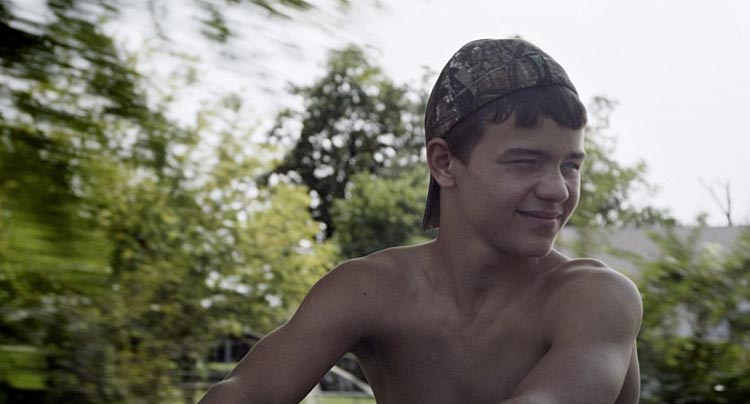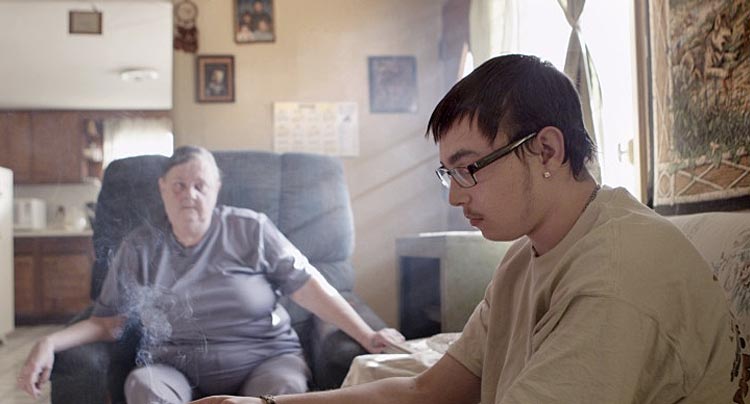
A strong reminder of how people continue to adapt and survive even in extreme poverty.

A strong reminder of how people continue to adapt and survive even in extreme poverty.
“We’re not trash. We’re good people.” These are some of the first words we hear in Tracy Droz Tragos and Andrew Droz Palermo’s Rich Hill. The film, a Grand Jury Prize winner at this year’s Sundance Film Festival, focuses on three adolescents living in Rich Hill, Missouri, a town of just under 1,400. That opening line acts as a sort of thesis for Tragos and Palermo, whose Direct Cinema approach concerns itself with showing their subjects trying to persevere through (mostly financial) problems in their lives. The human qualities of Rich Hill make it a somewhat affective, but disappointingly limited documentary.
The aforementioned statement comes from Andrew, a high-schooler and probably the most balanced of the three subjects. He’s a young and caring kid, affectionately playing with his sisters and taking care of his ill mother. His close bond to his family is most likely due to the fact that it’s hard for him to keep friends; his parents frequently move across the state and country looking for work, yet they always end up back in Rich Hill. His father jumps from one job to the other, trying on different occupations instead of settling on one career. Andrew expresses dissatisfaction with his parents constantly changing locales, but he remains optimistic. “God wanted us to come back here for a reason,” Andrew says as his family moves back to Rich Hill. “I haven’t found it out yet, but I will.”
Appachey is the next subject, a middle schooler with a large amount of developmental issues. His mother Delana lists them off at one point, including ADHD, OCD, ODD and possibly Asperger’s. He carries himself like he’s lived a lot longer than he has, casually smoking a cigarette and telling the camera about his father walking out on him and his family when he was 6. A lot of Appachey’s problems come across as the results of boredom and frustration, as he doesn’t have any idea of what he’d like to do with himself. At one point he considers going to China and becoming an artist, just because he likes the idea of drawing dragons all day. Without any focus or medicinal help (he’s non-compliant, according to Delana) he only has his mother’s tough love to rein him in, but even she’s beginning to lose her patience.

The last subject is Harley, a 15-year-old with the roughest background. His mother’s currently serving a prison sentence, a detail the directors don’t get into until later in the film. Harley faced different traumas while growing up, and shows clear issues with handling his anger. It’s evident that he had a close relationship with his mother before she went to jail, but despite her lack of a presence beyond phone calls and letters Harley tries to live a normal teenage life. Scenes of him going out with friends or dressing up as a Juggalo for Halloween are contrasted with issues about his truancy at school and possibly going to juvenile detention.
Tragos and Palermo don’t take an entirely detached perspective from their subjects, a quality that works in their favour. Most scenes play out with the camera quietly observing, except for a few moments where the teens interact with the crew. Harley shows concern with his hair looking bad on camera, prompting him to put some water in his hair and comb it. While he combs his hair, he warns the camera operator to keep their equipment away if any water gets on it. This kind of moment adds a level of comfort to the film by calling attention to itself, while simultaneously showing Harley for the kind, considerate person he is underneath his angry exterior.
Rich Hill’s subject matter offers plenty of potential areas to explore, but only some are looked at. The town acts as a representative for the small, Midwestern cities across the US dealing with hard economic times. These people are living in extreme poverty. At one point we see Andrew’s family use a coffee maker and an iron to heat water for a bath. These are the kinds of lives where long-term thinking isn’t possible. It’s a world of survival under hard circumstances made by choice or from external, uncontrollable factors.

For a brief moment, Rich Hill brushes with the idea of exploring what it’s like to live a lifestyle where wants don’t exist, as the needs are barely attainable. Delana explains her life story at one point, how she moved out at 17 before marrying and having kids. “I never got to have any dreams or ideals about my life,” she says. “I never had any dreams or hopes.” One of Rich Hill’s most fascinating qualities is watching its subjects, especially the parents, psychologically cope with their lack of financial stability. Andrew’s mother, suffering from an unnamed medical issue, implies she has a dependency on sleeping medication; Andrew’s father refuses to settle anywhere, constantly changing up jobs and locations for the hope of a better life; Delana eventually hands Appachey over to the juvenile detention system, unable to handle things on her own. This information helps paint an interesting picture, but Tragos and Palermo don’t seem too interested in filling in the missing pieces.
The two filmmakers prefer to lean on a more humanistic approach, choosing to back up Andrew’s statement in the opening instead of delving deeper into their subjects’ lives. This method isn’t entirely successful, as Andrew, Appachey and Harley’s stories are all fascinating in their own right, but the overall impact is lacking. There’s no need to prove or highlight these children or their families as “good people” because it’s already there. Breaking through a stereotype to show the person behind it is admirable, but this kind of approach feels overdone given the specific stereotypes being addressed here. It’s disappointing in its simplicity.
Rich Hill still makes for a well-done documentary. With over 450 hours of footage, Editor Jim Hession cuts it down to a well-paced 90 minutes. Andrew Droz Palermo also worked as Director of Photography, with some moments (especially the opening and closing montages of the town) providing great imagery. As Rich Hill closes, Harley talks to the camera before grabbing the bus to school. He tells the crew he’ll see them later as he gets on the bus, but we don’t. The bus drives off, and with a cut to black the documentary starts the standard pre-credit “Where are they now?” title cards. It’s a strong reminder of how, after the film ends, the people in it will continue as they always have, trying to adapt and survive.